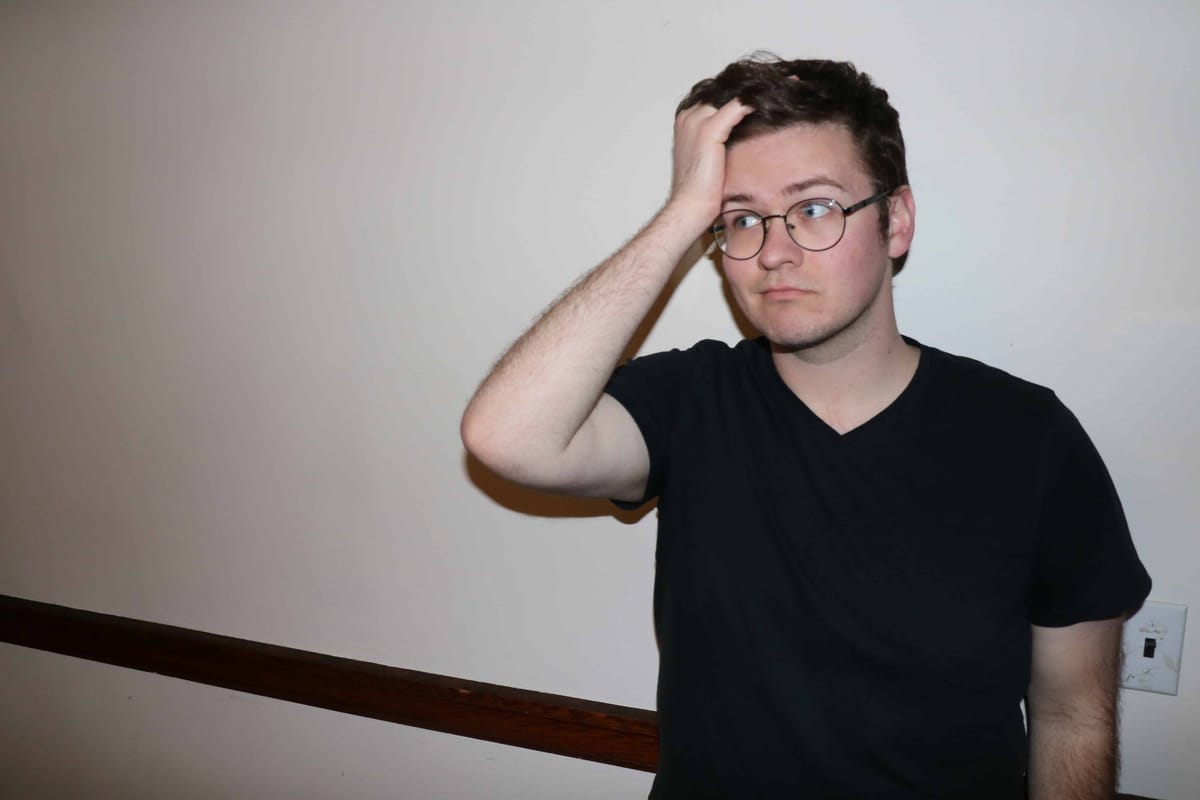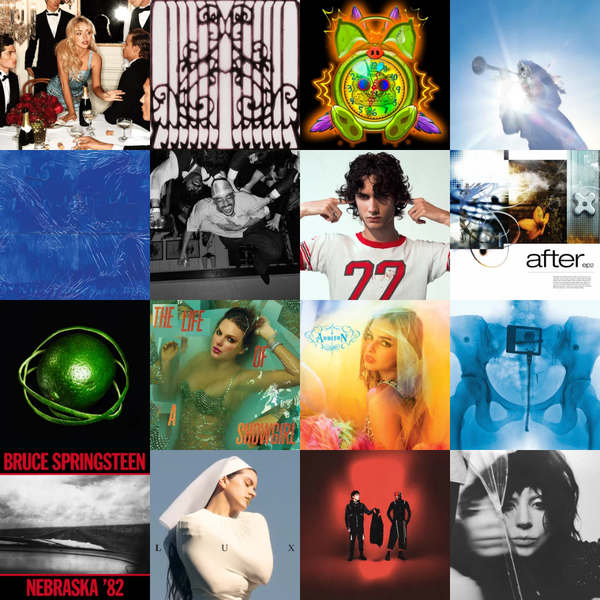Beyond The Page #1: Mic The Snare Brings Funny, Insightful Music Analysis To YouTube
In-depth interview with Mic The Snare, one of the best YouTube content creators talking about music today.

Hey all! Welcome to Transient Peak. This is normally a queer music newsletter, but I’ve had this idea for a while, so why not release an interview completely unrelated during Pride month? Part 2 of this series is coming with Spectrum Pulse later this week :)
The niche world of YouTube music analysis is a mixed bag – the House That Todd And Fantano Built allows for humor and analysis that can’t be achieved in a written format, but it’s hard to find people with the knowledge to back it up.
Enter Mic The Snare, the YouTube project of Nick Canovas. Over the last few years, he has become one of the most insightful channels discussing pop music, and one of the funniest as well. His background in audio engineering and music theory (via the Sound Recording Technology program at UMass Lowell) often informs that humor, leading to running gags like calling Chord Overstreet "Sus4 Nearby Sidewalk” and similar names in his video essay on Glee. Rest assured, there is nobody else online or off who goes into multiple tangents about the kick drums in Pitbull songs, and that attention to detail and the mining of that detail for laughs is what sets him apart.
His flagship series, Deep Discog Dive, does what it says on the tin, going deep into an artist’s discography and history, analyzing on each record. When we spoke, he had just released his DDD on Chicago indie band Ratboys, and was at work on his next project about Pitbull.
We talk about Pitbull, Ratboys, Jacob Collier, the necessity (or lack of necessity!) of music, and the future of music criticism. Read till the end to find out how he prefers to mic his snares!
Talk a bit about your background at UMASS Lowell. How did that inform what you do now?
Some engineering programs go all in on the audio engineering side, which I guess is nice depending on who you are, but what I liked about my curriculum is that it was evenly split between the music and the engineering. So for the first two years, you learn an instrument, you're just a typical music performance or composition student. But then for the last two years, they put you in the studio. What's nice about that is that not only do you get to learn the basics of engineering and how to use particular gear, signal processing, things like that, but you also know how to converse with a musician and how to talk with musicians so that you're not completely at a loss.
What made you decide that this was the format that you wanted to get across your information?
And in terms of the YouTube channel, I had wanted to start one for ages before I went to college. I was back home after college and I was like, “I miss having the conversations about music that I had with my buddies”, and I wanted an outlet to do that again. And Taylor Swift's reputation. That was the primary catalyst.
Walk me through the history of the channel so far.
The first year was primarily the very short album reviews where I would just give a quick joke about a record within 5-10 seconds that was inspired by a channel called Here Lies Music. I also did what I called the examining videos, but it was basically just video essays or case studies. So the Carly Rae Jepsen video, the Taylor Swift video, the War on Drugs video. Late 2018 is when I started doing the album reviews as one cohesive thing every month, which I called the Quick Review Basharoo. Wow, I have not said that phrase in a while.
2018 is when I had my first video blow up. It was the So Bad, it's Good video that I did, which I have not watched in ages, my gosh. But that was the first one that was, I think that's at 600,000 views at this point. In 2019, I did a sequel to that, which was a lot of fun.
Even with the early DDDs, there wasn't really ever a point where I did just a one-off joke about a record. It was always a little bit of history, a little bit of my thoughts. Less edited than what I do now. It was still mostly just me talking to a camera, but that was really the maturation stage of the series. Then I did the Radiohead one, and that was the first longform video.
I started Mic’s Monthly Mix, I think May or June. And then I stopped doing the mixes. They just weren't getting the attention really, I thought that revamping the format would reinvigorate my interest in doing them. It did for a bit, but didn't really last. From there it's really just been the handoff between the one-off Examining videos on a subject I'm interested in, and then the Deep Discog Dives with the occasional year-end roundups for good measure.
Let’s talk about your influences both for the video essays and for the humor in your videos. You’ve talked a lot about [early 2000s online webseries] Homestar Runner, and other people have mentioned Scott the Woz.
Yeah, let me think. So Homestar Runner, Scott The Woz is great. Adam Neely was a big one. Videogamedunkey was another one. I feel like all of us in the space are influenced by Fantano just because he is just the biggest person on the site. So I would throw him in there too.
Can you walk me through the process of longer videos?
I usually try to have a video out once a month. There was one point a few years back where I was able to get two a month. I got the Strokes and Arctic Monkeys out in the span of a two week period. I don't entirely know how I did that. I'd like to go back and ask my past self where I got the energy for that, though. The one I'm doing now, the one that's going to come out this month.. for some reason, this artist has 14 albums. (Holds up a Pitbull-branded candle, a prop for the opening gag of the Deep Discog Dive episode.)
…so why are you doing Pitbull?
I just thought it'd be funny. And then I looked into it - I've already committed, but he's got 14 albums.
What did you learn about Pitbull? Was he always like that? Was his early music better before he sold out?
Oh, yeah. No, I don't think he ever did because if you go back to his first three records, really, a lot of the DNA is still there. A lot of the sound is more inspired by Crunk and the dance rap of the time. But you're still getting Pitbull out here talking about how successful he is, talking about how much money he has, how many women he sleeps with. It's all still the same stuff. But at the same time, the lyrical lens is more focused on how great he is. Once you get to Pitbull Starring in Rebelution, the one that has [early hit] “I Know You Want Me (Calle Ocho)”, you can see the shift happening where he's starting to create music more focused on having a good time.
He's not there to show you how great he is, the goal is to look at this great time that we're having. Look at all the money we have, all of the nice clothes and cars and women we have. And then in tandem with that, he is still bragging about himself being Mr 305 coming up from Miami, traveling all over the world. It's still baked in there, but it is delivered in more of a… not holistic, that's not the right word, but it's -
He’s a conduit for people to have fun?
Exactly. He's recognized the service that he provides to other people.
That is such an interesting arc!
Yeah, it's something else. I'm roughly at the last three records, which means I'm pretty much past the point where he's off the charts and not really doing too much, but there's still some interesting stuff. He's got a song called “3 to Tango”, which is one of the most bizarre… it's not even a love song, really. It's like a song where a guy is about to have a threesome, but he's talking about it how a 12-year-old boy would talk about it.
How did you end up interviewing Ratboys?
I had the idea for a while to try doing DDD with an interview because I thought it would just be interesting to get a band to sit down and do a talk about their career up to this point, especially with a band like Ratboys, whose The Window came out last year. That's been their breakthrough moment so far, but they've been active for basically a decade at this point. And the way that it came about is that the PR company that handles them [Pitch Perfect PR] reached out to me about reviewing the latest Mitski record, which was very cool. But then I reached out and I was like, “I don't do album reviews, but I have this other idea that might be cool if you're down.” When I put Ratboys in my Year End Roundup videos, I sent that to them and they said they’d be down to do an interview with you and to talk about that. So that's how that came about, and it was a phenomenal time.
Was the process for the Ratboys DDD different from your normal process for the Deep Dives?
It didn't differ super heavily. I think the big thing was just as I was doing research, I kept in mind if there were certain aspects of the band's career that I didn't find much info on or I wanted to personally know more about, I would just get to ask. So that's how I guided my interview with that case. It was things that I knew about the band already, but I wanted to get their additional thoughts about it just because I thought that that would enrich the story or it would enrich the context that certain records were made in. So the first one in that warehouse space that they worked in, getting them to say they’re still friends with everybody who's there.
And it was really fun looking back on that. I loved being able to intersperse clips like that into the video because I thought that it had just enriched the overall story and it enriched the band and the music behind it. So I don't think it differed necessarily, because I was still doing the same thing of listening to the records on repeat, researching as much as I could, filming, voiceover editing, that sort of stuff.
Are you thinking of examining more relatively small bands in the future?
It'll depend on if they'd be interested to talk more or talk with me about their career - my hope is that I can cover bands that I truly want to shine the spotlight on.
The Deep Discog Dives started out short-form before turning into full-fledged video essays. When you remade the DDDs, how did you do things differently?
I'm trying to redo all of the ones from that first wave in 2019. I've done most of the artists from that first wave already. I've redone theirs. I think the only ones left now are Blur Oasis, Nick Cave and the Bad Seeds, and My Chemical Romance. Once I'm done with the DDD before it, I then have a three-four week span where I get back into the records. I try to find history. I try to find specific points in the music that stick out to me, like, oh, is there a sample that they use? Is there a line that would make for a funny joke? See if that ties back into the history at all. And then I also try to buy props or get particular shots ready,
I bought a life-size cutout of Pitbull too, because I had this idea where I would literally go to Times Square and take a picture of Pitbull with a Kodak. I didn't end up doing that, but I'm still going to find a way to get a cardboard Pitbull in the video. I'm going to try to get some use out of him. So that's where I am now, where I'm starting to do some of the more intense listening for the records. And then I've got a video coming out in a few days on Jacob Collier.
For or against?
I like him as a person, and he's incredibly talented. I don't always click with the music. I feel like that's most people's opinions on him. But I also think recently with the Djesse Volume four coming out, there's this new air of toxicity that's come into the discourse where it's like ”his music is AI generated, he's generic.” That's more personal attacks. And it's like, okay, let's simmer down a little bit. And I'm making a video basically about that even if we do not care for the music, we can also still respect the man and the attempts at artistry... if you will.
I'm more interested in hearing the perspective from somebody who actually has a musical background versus somebody who's like “ugh, he's so annoying.”
Can I actually walk through one of the points that I make? Because you might find it interesting just as someone who also engages with music in the same way that I do.
Sure!
I see a lot of comments about the extraness in his music. Does he need to throw in so many instruments? Does he need to do the Djent breakdown with Willow Smith? Does he need to do all of this? And on one hand, he said that that's part of his style of layering things together in excessive quantities. And my response is, I reject the question because art is, music and art are incredible. They are important to our society, but I wouldn't necessarily say that they are necessary. It's like no piece of art is truly necessary, but that's also what makes it great, the fact that beyond just basic survival needs, humans can create beautiful music or beautiful paintings or films or video games or anything like that, and they can still speak to us. None of those things absolutely have to exist, but the fact that they do is wonderful.
That's also something that I think about with music criticism and the music analysis that you're doing and interviewing - how to make it meaningful when it's not necessary.
What I do isn't always that serious. No one dies if I do my job wrong, no one gets hurt. At the end of the day, I'm talking about pop music and making jokes about Crazy Frog. have this other point of when we talk about music online, sometimes it feels like what we're doing is criticism, but then other times it can feel like we just want different things, or we're putting this song or artist up against this song or artist that are not remotely related, and who, in my opinion, give different emotions or different value propositions, and I think that's unfair. We can engage with the work itself, but oftentimes we find the need to compare it to somebody else's when really they're not trying to do the same thing.
I'm wondering if you have any thoughts about where things are going with music criticism.
Have you read the Oral History of Pitchfork? I think Slate published it.
I do know people that were in it. I actually worked at Spin as an intern in 2018 before that went downhill, and a lot of those people went to Pitchfork - I didn't end up reading it. I’ve written for the site since 2019 and know so many people affected by the site’s restructuring.
I mean, it's a good piece and it's nice to hear so many people's perspectives on it who were there and in the weeds. There was a part of it that… First, I will preface, I am not glad that Pitchfork is getting folded and that people lost their jobs. Literally no way. I wish that did not happen. You see people online who still have the stigma of Pitchfork being that place that gave their favorite band a zero out of 10, or who reviewed Jet’s Shine On by posting a video with a monkey pissing in its own mouth.
Obviously that's not what they are doing now. I think that discredits a lot of the work that in recent years, especially Pitchfork had been doing a lot more with the coverage of scenes and with particular albums and genres. I think they had been doing good work, and yet I keep coming back to how many people were so hyper fixated on the score, which I don't think is Pitchfork's fault necessarily, I'd be curious if I could peek into an alternate dimension and see what happened if Pitchfork got rid of the score around 2016 or 2017, I don’t know if it would change anything.
If they got rid of scores, I don't think Pitchfork would have lasted this long. I think it is unfortunately vital to the way people talk about music and vital as stats that people can hang over each other's heads.
I think it was [former Pitchfork associate editor] Cat Zhang who said “Everyone who works at Pitchfork probably has a really ambivalent relationship with the score system and yet knows that the moment that Pitchfork abolishes it, the whole site tanks."
How do you feel about written criticism vs YouTube?
In 2016, 2017, I saw a lot of debate online about Fantano and if he was going to replace that kind, the print model, if he was going to replace Pitchfork. I don't think one is going to replace the other. I think both absolutely still have their place. I mean, it's the sort of thing where it's like, I think the writing and being on camera, what I do are very different skill sets to have, and some people are good at both, but it's way easier and more common to be good at one or the other. If you were to transcribe any of my videos into text and just lay 'em out like a Pitchfork article, people would probably think it sucks because it's like I'm not necessarily writing for the page.
I'm writing in my own tone of voice to sound like just a dude who's talking about music, whereas maybe one of the writers at Pitchfork or Stereogum or the Quietus, if any of them got on camera, they might not be able to have a person like a presence on there in the same way that I do. It's such different skillsets, and even though I'm in the visual world, so much of my work is indebted to Stereogum and Tom Breihan and Michael Nelson. I want to read his Drake piece on Views again. I cited that in the 2010s video, and it's one of my favorite pieces of writing about Drake to this day.
I think we're all part of the same ecosystem. I don't think it's a us versus them thing. I don't think it ever was, but I don't think it is these days. If we have an enemy, it's like the upper echelons of capitalism and the ad economy and social media, that sort of thing. That's the enemy, if you will, but yeah, it's not a us versus them thing.
Are the interstitial songs between every album on Deep Discog Dive? Is that you?
Yes, that's me. So was the QRB jingle.
Are you working on some of your own music or engineering for other people? Is that something that you're interested in doing?
I don't know. I do make a little bit of music though. It's usually just for the sake of, if I have an idea in my head, I put it down into Logic. I wouldn't say that I am necessarily crafting them into full songs per se, and when I work with other people, honestly, I don't do too much engineering or that sort of thing these days for other people. If anything, when people have questions about making videos or building an online presence, that's usually what I help them with because honestly, I feel like I'm biased because I do work for a microphone company and we interface with a ton of musicians, ton of front of house engineers, but also a bunch of creators because that space has just exploded over the past couple of years.
Usually when it comes to helping people with engineering, it's usually in the context of making videos, and it's nice also to work with people who don't have the same expertise that I have, because it's nice to not live in a bubble of only talking with engineers or talking with musicians or stuff like that. It's nice to have an understanding of, ah, this is what a regular person getting into this without my background would know, and that's nice to realize, I guess. Then there was another thing in terms of also making music. I was in a choir for a bit of last year in the fall and the winter. I'm not doing it now because of just being busy with work in the channel. But that was fun to get back into singing.
I have to ask this: Your logo has an SM57. Is the SM57 your choice for micing your snare?
Yeah, it is. It's just a classic.
Any reason the top of the snare isn’t mic’d in the logo?
I think I just wanted something that looked like a T, because I thought that I would put the “t” of Mic The Snare as the logo. But I would either do both the top or the bottom, or I would do the top. I wouldn't ever just do the bottom.
You’d only get the wires!
Easily the best part.
Make sure to subscribe before you go. See you later this week for Spectrum Pulse!


